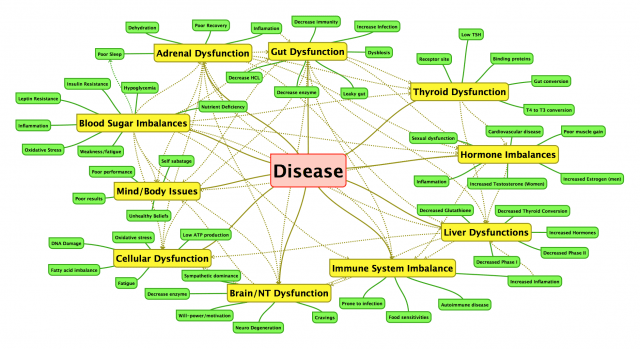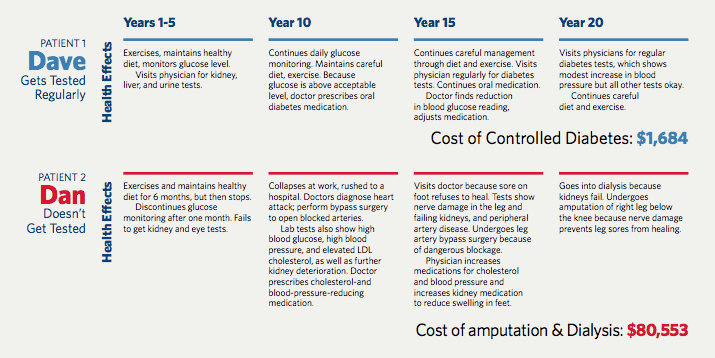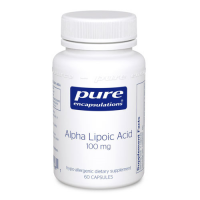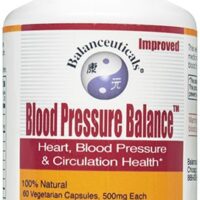Why Functional Medicine? Well, if you’re not sleeping well, seem cranky all day and your stomach seem always upset. In addition you’re feeling a bit down and just can’t figure out why. You head to your primary physician for—if you’re lucky—a 10-minute talk about what’s going on with you. The physician listens, nods his/her head a few times and then hands you a prescription or two, shakes your hand, and says “this should help”. Case closed unless you call for another appointment.
You get home and Google the prescribed drugs to read all the potential side effects, constipation, dry mouth, dizziness, confusion, thoughts of suicide, lower sex drive and the list goes on. Does this approach actually make anyone better? In a word, no. It’s an attempt to mask the actual cause of your symptoms verses address them to heal.
Why Functional Medicine?
It’s the most profound and effective way to treat patients—particularly those with chronic health issues and here’s the 7 reasons why Functional Medicine is FOR YOU:
1. Functional Medicine is all about you
In simplest terms, think of it as the ultimate in personalized, one-on-one, therapeutic relationships. It’s a health-focused, patient-centric partnership, in which doctor and patient work together to dig deep and find out the causes of illness and disease. We examine not only the patient, but also their unique history, environment, lifestyle and underlying factors, and then develop a health-enhancing, usually drug-free plan to help restore the patient to good health and get him or her on a life-long path of wellness. With Functional Medicine, we look beyond the laundry list of symptoms; the whole person is taken into account.
3. Functional Medicine is not assembly-line medicine
Our current healthcare system is, to a large extent, governed by profit-driven conglomerates that essentially force physicians to manage huge caseloads and keep people moving through the system as quickly as possible. It’s mass-produced, assembly line, quick-fix, put-a-band-aid-on-it medicine, with little hope of creating long-term health. To it’s credit however, Conventional Medicine is great at managing medical and surgical emergencies, medical crises, acute infections and trauma, but falls way short when it comes to treating chronic diseases such as diabetes, heart disease, gastrointestinal problems, chronic fatigue, autoimmune diseases, functional disorders, musculoskeletal problems and stress related disorders. This is where Functional Medicine is near perfect with its more comprehensive, thoughtful individual approach. After all, you are unique and so should your health recovery plan be.
2. Functional Medicine is artisan medicine
With Functional Medicine, the patient experience is anything but conventional. One might even call it ‘artisan medicine’, because it an art of balance, involves time, care and patience, since true healing doesn’t happen overnight. With Functional Medicine, we treat the person who has the disease rather than the disease the person has. It’s not unusual for my colleagues and me to spend an hour or more with patients, listening to their histories, doing the detective work, asking questions, and examining the genetic, environmental, and lifestyle patterns that effect health. By addressing the underlying causes of illness and disease, Functional Medicine practitioners are able to design unique, personalized healing plans that Conventional Medicine literally doesn’t have the tools, training, or the time for.

4. Functional Medicine is the best of both worlds
Functional Medicine is not an either/or system, but rather a true combination of Conventional Medicine and many different alternative and complementary therapies. It acknowledges the strengths of Conventional Medicine for acute and crisis-care, but also realizes that this approach does not have the tools for preventing and treating chronic diseases. Unlike conventional physicians, we are able to tap into all the tools of healing—drawing from Western, Eastern, alternative, preventative and integrative medical practices—to help our patients heal. By pulling from all of these approaches and by paying special attention to diet, exercise, nutrition, supplementation and the workings of the mind, we’re not just giving patients a band-aid, we’re giving them the tools to create sustainable wellness and vitality. To me, is what true healing is all about.
5. Functional Medicine looks for the cause
In Conventional Medicine, doctors try to make a diagnosis and then apply a treatment for that particular diagnosis. In Functional Medicine we are less concerned with making a diagnosis and more concerned with the underlying imbalances or dysfunctions. These are the mechanisms of the disease process. We aim at treating those underlying disease mechanisms and ultimately look for the causes of those imbalances.
6. Functional Medicine is medicine on a mission
I call myself a health evangelist, in part because I am a man on a mission. I aim to show the unwell how they can transform their health. Certainly they will need to do the work as I can’t do it for them, but we will work as partners to restore balance and health to their lives. And participating in the process, that slow transition from illness to wellness, is one of the greatest joys of Functional Medicine—for both patient and practitioner.
7. Functional Medicine is true Health Care
Functional Medicine is true health care, unlike the disease care model of Conventional Medicine. We now have the knowledge to go beyond the current crisis care model and offer patients a much better approach to their health. We can incorporate lifestyle medicine, nutrition, supplements, stress reduction and exercise to improve the functioning of organs as a means of preventing disease and creating vibrant, sustainable health.
Functional Medicine is literally FOR YOU.






 Cut Cortisol 31% – Schedule a
Cut Cortisol 31% – Schedule a 







